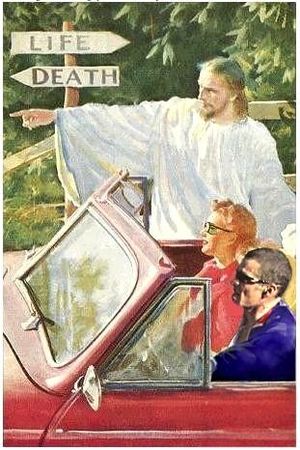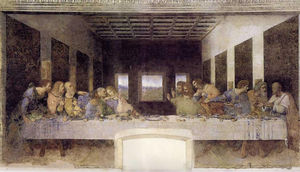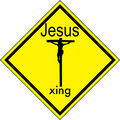Jesus
“Anyone who looks at a woman desiring her, has already committed adultery with her in the depths of their heart. [...] Anyone who looks at another person with hatred has already killed him in the depths of their heart. [...] Anyone who looks at an object with desire has already stolen it in the depths of their heart. [...] Any President who looks at a country on Google Earth has already invaded it in the depths of their heart. [...] Anyone who looks with contempt at an article in Uncyclopedia has already deleted it in the depths of their heart.”
– Jesus, preaching
“But then, is there anything we're permitted to look at?”
– The apostles, asking Jesus
Jesus Christ, "Messiah", "Son of God", also known as Jebus or just Jesus, is the main character in the 27‑part fictional comedic tragedy series, The New Testament. The story, set in the early part of the first century CE, begins with a boy growing up in Israel. While studying religious texts, he starts to believe that his father (not his stepfather) is actually the Almighty God mentioned in the scrolls.
At thirty years of age Jesus sets out on His quest to coerce desperate people into believing His fantasies, preaching that He is the Savior of World, and without Him everyone and everything would cease to exist. Finally at the age of 33 He is crucified by the Roman Empire for "gross endangerment of the public at large". His body is buried in a tomb, and three days after His death, His body is stolen by grave robbers, but avid fans, followers, and imitators of "The New Testament" and this character, aptly called "Christians", insist that an angel from Jesus's books came to life, took Him back to Heaven, and that He is now the Supreme Power of the Universe.
| Part of a series of articles on |
| Christianity |
|---|
 |
Birth
Jesus was born on December 25, 5 BCE, in a pig trough which somehow made a star shine brightly. Then three wise guys brought the infant gold, frankincense, and myrrh which means absolutely nothing to a newborn. But at least they weren't as stingy as the shepherd, who brought the kid nothing. Same goes for the angel, and imagine what an angel could give you, but still, nothing. Christ, what does a god have to do to get a clean diaper around here?
Growing up
Jesus was just like any other regular kid growing up, He enjoyed spending long hours in the temple talking to Himself while kids chucked grapes at His head and His own parents wished He would just get hit by an ox cart. Even at a young age, He would speak in metaphors. Much like the Founding Fathers of America, Jesus refused to explain what the right to bear arms meant, and also repeatedly questioned what a submachine gun was in a feeble attempt to dodge the question.
Work
Like most destructive liberals, Jesus decided to disobey The Man, and broke every societal standard set during the time period. He aligned Himself with twelve gangsters and lowlifes, curiously named later "The Apostles". Members of this group included a conniving tax collector, some lazy fishers, and a man who He knew would ultimately betray Him to His death.[1] Jesus also refused to stone people for petty crimes, blasphemously called Himself bigger than Solomon, trashed markets with an improvised whip, wore open-toed sandals, and talked to women. Obviously, being such a rebel gained Him quite the reputation. Nevertheless, it is believed that the main reason He opposed stoning was that He wanted to collect those rocks to suit His greater goal.[2] With these twelve followers Jesus began to monopolize the construction industry and His "career" as an architect of triangular modernity took off.
Later life
Jesus began to care about some of His disciples more than the others, such as John. He told John to write a book, get a deal with Walden, publish it, and then make it into a movie. He also told John to not use the names of some of the loser disciples because they suck, so Jesus changed the twelve disciples (later known as apostles) to John, Peter, Doubting Thomas, eight other guys, and Judas, aptly titled "Lord of the Sucky Friends".
The Last Supper
Jesus said one day that Judas was going to betray Him and everybody was confused. Judas explained that with Jesus out of the picture[3] he could hire the Russian Mafia to brutally rape the rest of them and then have complete control over Jesus's merchandise. Judas then left cackling and saying how he would never regret this. Jesus then told John to snap a picture of this because it was a Kodak moment, He also told him to address a letter to Dan Brown and tell him not to go overboard on the sequels because they're only going to get worse. Finally, Jesus gave His final address. He told John and Peter to beware the three Antichrists: Rosie O'Donnell, Squidward Tentacles, and Ronald Wilson Reagan. He told the other nine disciples to screw off and get lost because they were all going to die in a gang war.
Jesus went on to star in His own hit play, The Life o' Jesus, about a group of friends who lived in a hotel. They become obsessed with the wonders of the coffee shop down the road. Jesus played Himself and had an on-and-off relationship with another one of the main characters, Rhiannon. The show was a commercial success, and film adaptations abound.
Crucifixion
The Roman goblins got a little cocky and decided that instead of doing the honorable thing to a level‑80 mage (stoning him) they would instead murder Him on a cross, which would subsequently become His biggest marketing ploy yet. They nailed Him to it, killed Him, and then threw Him into a tomb. But just ask Gandalf, and he'll tell you that's not how you kill a mage.[4]
Resurrection
Many people believe that Jesus created another account on the MMORPG called The Bible, but many believe this wasn't Jesus. However, some people who believe this to this day will tell you that nowadays the profile is called Pope. According to the children's book The New Testament, Jesus came back to life and somehow went up to Heaven being carried by white slaves which are mistaken for a cloud. Others say Jesus was resurrected by the Decepticons.
Salvation
In the story, and according to Christians, Jesus became the Savior of the entire world. As you would expect this story shares many elements with other works of fiction with a "savior" character such as Frodo Baggins from The Lord of the Rings, Connor MacLeod from Highlander or Flash Gordon from the eponymous series. Each has to save the world from evil, although in the case of Jesus, nobody wants, or needs to be saved. In an additional juxtaposition to most other savior stories, Jesus does not use violence to accomplish His goals, but instead uses the threat of violence to force His will upon others. Finally, the character of Jesus when observed by anyone other than a "Christian" is very much an antagonist. While Satan (the antihero of the series) wants everyone to drink, party, and get laid, Jesus denounces these things, and threatens all who partake to eternal suffering. For a reason we still don't understand, "Christians" can't internalize the inconsistencies of Jesus's character, or His teachings within the story. They believe just as Jesus did that carnal and visceral pleasures are evil, but they can't tell you why without bringing Jesus into the discussion (circular logic). This makes it nearly impossible to approach any self-proclaimed fan of the "New Testament" series with a counter argument, because if it doesn't fit in with Jesus's teachings, it can't be considered canon to the story and is therefore dismissed.
Merchandise
Claiming at ten to be the savior of mankind Jesus began marketing His W.W.J.D. (What Would Jesus Do?) bracelets to younger unsuspecting children. Unfortunately, most of his customers were subsequently beaten when they told their fathers and mothers they spent three silver pieces on some ten-year-old's bracelets. Jesus also tried to sell Christmas trees and Easter bunnies during most holiday seasons, but everyone in Bethlehem was a Jew.
Sexuality
As the Son of God and Savior of us all, Jesus could have had all the women He wanted. He was extremely skilled in the art of seduction (four wrapped around His finger from the get‑go), yet there's no scriptural reference to His having actually done even one. There are two possibilities:
- He told John to erase that part because it doesn't sound holy.
- He was too busy laughing and mocking the pathetic and hypocritical atheists to care about sex.
See also
- 'Roun dis tiyem, Agustis Seezr wuz like, "I can has sensus?" ('Coz while Quirinius was Teh Boz of Syria, is invisible sensus!) And all teh doodz went home for teh saying, "I iz heer!" So Joseph went from Naz'reth to Judeeah to Bethlehemm whar David wuz borned, 'coz David wuz hiz graete‑graete gran‑daddie, An Mary went wif him, 'coz she was gonna be married wif him an she had Jeebus n her tummy oven. When they wuz ther, it wuz time for teh kittn to be borned. it wuz a boy, so he wuz wrapd in blanket like burrito an placd him in fud dish (srsly!), cuz innkeeper wuz liek, no room here kbai!
- ↑ Not because of any precognitive thing, mind you – the guy simply said so, openly, on many occasions.
- ↑ helping the Mayans finish their pyramids on time
- ↑ Because the two events occurred one day after the other, The Last Supper often overshadows The Last Poker of the previous evening, when Jesus and His Apostles held their final Wednesday night Poker game.
- ↑ Some crazy conspiranoids think Judas and the Sanhedrin were wholly responsible.













